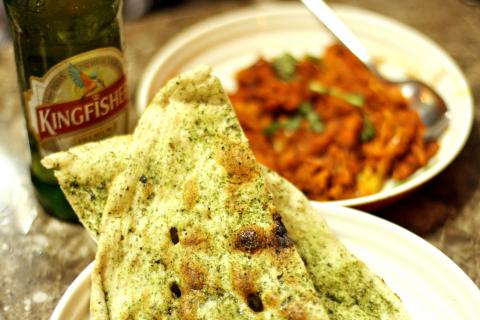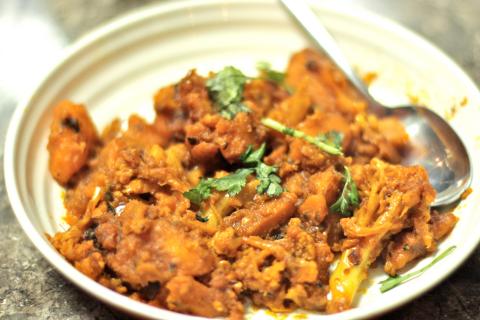Though it is located within sight of Taipei City Hall, Mayur Indian Kitchen is easy to miss because the small takeaway restaurant is tucked among a row of motorcycle repair shops and food stands behind the Keelung Road underpass. Mayur Indian Kitchen is just a kitchen counter with a few tables lined up on the sidewalk, but it offers a wide, constantly changing assortment of home-style Indian cooking. (A second location is located in New Taipei City’s St Ignatius Plaza (徐匯廣場) shopping mall).
Owner Mayur Srivastava worked as a hotel chef before opening Mayur Indian Kitchen six months ago. The eatery’s dishes are freshly prepared and feature whole spices instead of powdered versions. The restaurant specializes in north Indian cuisine, but also offers south Indian classics like dosa, or savory pancakes made from rice flour and lentils served with a variety of stuffings, and crispy samosas. The restaurant frequently changes its menus and offers specials depending on the season. For example, next week Mayur will began serving homemade yogurt, mango and lemon drinks for the warm weather.
“We keep changing our menu because we want to let people taste new things every time. There are so many dishes in India,” says Srivastava.

Photo: Catherine Shu, Taipei Times
The curries I ate at Mayur Indian Kitchen are mildly spicy, but can be made more piquant based on customer requests. The restaurant offers several jain, or vegetarian dishes, such as aloo gobhi (NT$110), which is made with sauteed potato, cauliflower, tomato and spices. I liked how the cauliflower was lightly cooked to retain some of its crunch. The tandoori chicken masala (NT$145) was also good, though most of the chicken was still on the bone and it became tiresome picking off the meat. My favorite dish of the night was the chana masala (NT$95), which paired very well with the butter naan (NT$55). Mayur Indian Kitchen’s freshly prepared version of the Indian flatbread is especially good: the edges are baked until crisp, while the middle is moist and chewy — just right for scooping up curry. The naan comes in 14 savory or sweet flavors. My companion and I also ordered the garlic version (NT$55), which was topped with a plentiful sprinkling of seaweed flakes. The flavor combination was fine but unexpected. We preferred how the plain butter naan tasted with our other dishes.
On a separate visit, I ordered a vegetarian lunch set with chickpea curry, which was made with a liberal helping of cumin. Even the simple cabbage salad included with the set was sprinkled with plenty of fennel seeds, which offered an interesting contrast to the tart vinegar dressing and was a cool palate cleanser after the rich curry and rice.
For dessert, Mayur Indian Kitchen offers both gulab jamun (deep-fried milk balls served in sugar syrup, NT$80) and gajar halwa (NT$95), which we ordered. The deliciously thick, sticky pudding-like dish is made with carrots and cashew nuts cooked in milk and made my sweet tooth very happy.

Photo: Catherine Shu, Taipei Times

Taiwan has next to no political engagement in Myanmar, either with the ruling military junta nor the dozens of armed groups who’ve in the last five years taken over around two-thirds of the nation’s territory in a sprawling, patchwork civil war. But early last month, the leader of one relatively minor Burmese revolutionary faction, General Nerdah Bomya, who is also an alleged war criminal, made a low key visit to Taipei, where he met with a member of President William Lai’s (賴清德) staff, a retired Taiwanese military official and several academics. “I feel like Taiwan is a good example of

March 2 to March 8 Gunfire rang out along the shore of the frontline island of Lieyu (烈嶼) on a foggy afternoon on March 7, 1987. By the time it was over, about 20 unarmed Vietnamese refugees — men, women, elderly and children — were dead. They were hastily buried, followed by decades of silence. Months later, opposition politicians and journalists tried to uncover what had happened, but conflicting accounts only deepened the confusion. One version suggested that government troops had mistakenly killed their own operatives attempting to return home from Vietnam. The military maintained that the

Before the last section of the round-the-island railway was electrified, one old blue train still chugged back and forth between Pingtung County’s Fangliao (枋寮) and Taitung (台東) stations once a day. It was so slow, was so hot (it had no air conditioning) and covered such a short distance, that the low fare still failed to attract many riders. This relic of the past was finally retired when the South Link Line was fully electrified on Dec. 23, 2020. A wave of nostalgia surrounded the termination of the Ordinary Train service, as these train carriages had been in use for decades

Lori Sepich smoked for years and sometimes skipped taking her blood pressure medicine. But she never thought she’d have a heart attack. The possibility “just wasn’t registering with me,” said the 64-year-old from Memphis, Tennessee, who suffered two of them 13 years apart. She’s far from alone. More than 60 million women in the US live with cardiovascular disease, which includes heart disease as well as stroke, heart failure and atrial fibrillation. And despite the myth that heart attacks mostly strike men, women are vulnerable too. Overall in the US, 1 in 5 women dies of cardiovascular disease each year, 37,000 of them